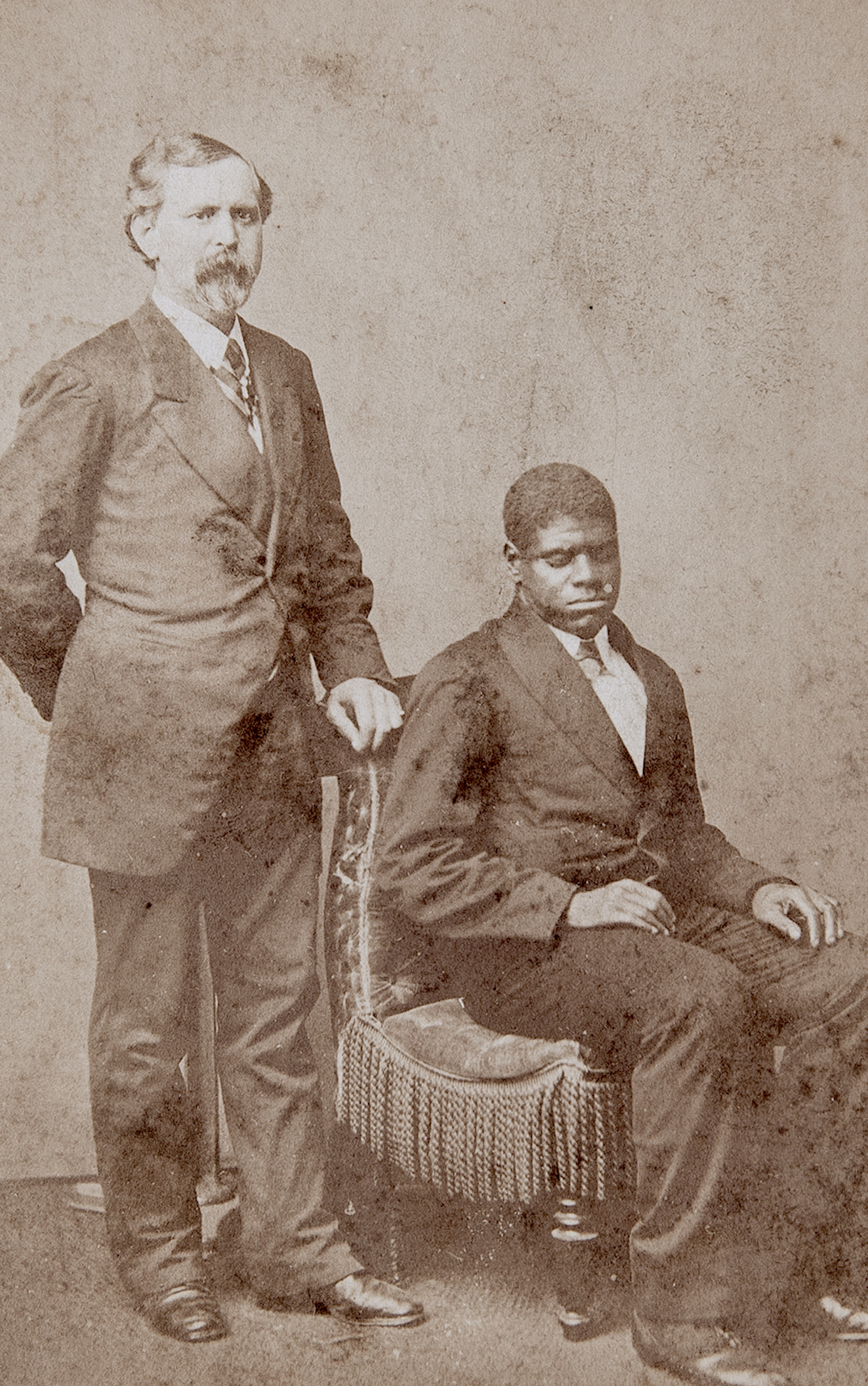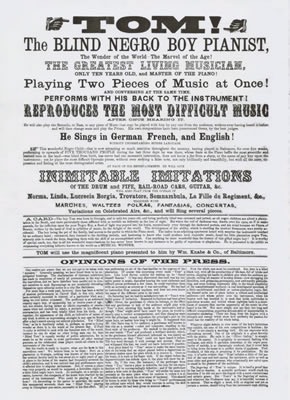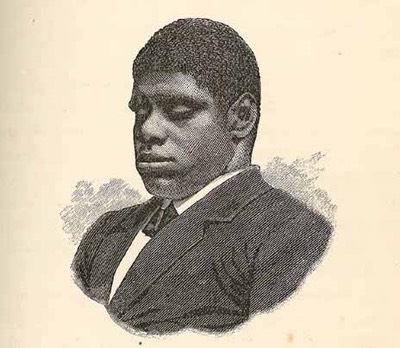Tom Wiggins died on June 14 in the year 1908. When he was born more than a half-century earlier, he had all of life’s bad cards stacked against him. He came into the world in 1849, a slave, blind, and the youngest of three siblings. Parents Charity and Mingo Wiggins had the misfortune of belonging to Wiley Jones, a Georgia planter up to his ears in debt and fated to lose his farm and all that went with it a year after Tom’s birth.
The members of the Wiggins family accordingly went up for auction, certain that they would be split up. Quite unexpectedly, though, they remained together when General James Bethune purchased them all and placed them on his plantation near Columbus. It’s not clear why Bethune essentially performed an act of charity in keeping the family together. The shadow of slavery casts suspicion over anyone connected to it, and few have been inclined to judge his motives charitably, especially considering what happened later. Yet putting aside the sordid circumstances that brought Charity, Mingo, and their three children into Bethune’s view, it is certain that he had no idea at the time how things would turn out.
Indeed, the hard reality was that the Wiggins adults were a bit past their working prime, and Tom’s blindness made him a considerable liability. As he grew from infancy, he only got worse because it became apparent that in addition to being sightless, he had something seriously wrong with him. About the time he should have been able to talk, he only grunted. When he did learn to speak, he was prone to repeat a few pat phrases, apparently unaware of their meaning.
He spent long spans of time flapping his hands and then would dig at his eyes, sometimes violently gouging them with his fingers. He rocked at his waist back and forth for hours on end. He either was unable to try or stubbornly refused to learn the basic skills for eating, flinging away knives and forks and spoons when they were placed in his hands. Instead, he used his fingers to scoop up food, which he smelled thoroughly before cramming it in his mouth. His loud snuffling was to sniff out any trace of dairy products, especially butter, which repelled him. The slightest change in his routine — food not being set before him at the same time every day, for example — sent him into tantrums, memorable for blood-curdling screams, hammering fists, and violent kicking spasms. His parents despaired. Bethune concluded that Tom was an “idiot.”
Everyone tried to cope, and, interestingly, there doesn’t seem to have been any plan to lock him away. Instead, he was given the freedom of house and grounds, and the Bethune children watched after him with enough attentiveness to notice things grownups didn’t. He didn’t show the slightest affection for his mother and father and displayed little interest in anything of the world, but the children knew before anyone else that sounds calmed him. Certain sounds engrossed him. Storms caused him to throw his head back, stop his rocking, and focus on rain pattering against the roof, spattering in gutters, and rushing out of downspouts. Any machinery fascinated him. He would come running to hear a coffee grinder, and the wonders of a butter churn were enough for him to briefly set aside his aversion to the stuff in it and hold his head close, contort his face, and nod in time with the pulsing slosh of the whisk. Ticking clocks, whirring sewing machines, grinding millstones, these and more would arrest his attention as if to put him in a trance.
It was also the children who unlocked Tom’s hidden world in a way nobody could have imagined. Before he turned five, he heard one of them singing and instantly began singing too, exactly repeating the lyrics and melody. The children discovered he could do this with any tune. It struck everyone as an amusing trick, and Tom became a kind of pet. But there was more to come.
One day, the Bethune sisters were practicing a song on their front porch when Tom joined in perfect unison for the first verse, which wasn’t unusual. What he did for the second verse startled them. He did not sing the main melody as before but commenced one in perfect harmony that cavorted through scales to match their voices with a surprising and beautiful improvisation. It set them back. This was magic rather than mimicry. On the possibility that there was more to Tom Wiggins than met both the eye and ear, Mary Bethune sat him down at the piano. He had tinkered with it before, but everyone had thought it was only for the sound. When Mary played some music, she watched in amazement as he confidently played what she had, note for note. She tried lengthier and more complex pieces. Tom matched them, again note for note, but he seemed to play with more flair and feeling. Left alone, he made up a tune of his own, an imitation of a thunderstorm. It was the perfect melding of tone and sound filtered through Tom’s imagination, the kind of thing that would be incorporated into his act for the rest of his life.

For it wasn’t long before Tom Wiggins was performing on stage. By Bethune’s arrangement, the first concert was at Columbus’s Temperance Hall to a packed audience when Tom was eight. Mary Bethune had been giving him “lessons,” which actually meant she had played a modest repertory that he had instantly committed to memory, the beginning of a mental repository of readily retrievable pieces that over the years would include pavanes, nocturnes, waltzes, concerti, idylls, berceuses, tone poems, symphonies, and all other forms, the better part of ten thousand melodies, glissandos, counterpoints ranging from the simple to the intricate and complex. It was all music that Tom Wiggins had heard once and never forgot afterward. The prodigious memory extended to everything in his life: to the day he died, he remembered every person he had ever met, even if only once and quite casually. And he could, upon hearing a person’s voice, say his or her name and recite the circumstances and place of their meeting.
But it was his astonishing technical skills at the keyboard that delighted audiences and mystified virtuosos. It meant that Tom led a life of never-ending concert tours that made first his owners and then his handlers exceedingly rich. He played for President James Buchanan and was booked in Baltimore during the 1860 Democratic Convention. He delighted drawing rooms by perfectly imitating Senator Stephen A. Douglas giving a speech, an hour-long address that Tom could recite verbatim. He toured Europe to play for nobles and crowned heads, and before long, he ranked among the most renowned pianists of his generation. Mozart could play beautifully while on his back with his hands inverted over his head. Tom Wiggins could do that too, but he could also simultaneously play one melody with his right hand, another with his left, and sing yet a third. He sometimes employed that sort of circus trick in concerts, but mainly he featured pieces by the entire array of classical composers, such as Mozart, Brahms, Beethoven, Schubert, Strauss, Wagner, on and on.
Added to that pantheon was Thomas Green Wiggins, whose compositions were eventually transcribed and published, usually under pseudonyms — something done at his request for reasons known only to him. Some of his work was like his original take on a thunderstorm, meaning they were musical imitations of machinery or natural events. Still, others were traditional in form but striking in originality. (Listen to samples here.) In 1864, he composed a ten-minute tone poem that recreated the Battle of Manassas by having the piano imitate locomotives delivering soldiers, fifes marching men to battle, thunderous artillery and rifle reports, and a montage of themes that included “Dixie” and the “Star-Spangled Bangled Banner.”

The Bethunes reaped the profits. Tom remained a slave until the end of the Civil War and toured only in the South. For an idea of his earning potential, at one point, Tom was “leased” to a manager for $15,000 a year, about a half-million dollars in today’s money. After the war, it was only a matter of time before who had custody of him was decided by the courts. Out of a complicated web of pleadings and proceedings, a northern woman who had briefly been married to General Bethune’s son was awarded custody, which in Tom’s case was actually just another form of ownership. He could never care for himself and never grew out of the peculiar habits of his early youth — the constant rocking, the repetitive phrases, the lack of table manners, the digging at his eyes, which were always closed.
Newspapers described him as an “idiot genius,” and more informed analyses later labeled him an “idiot savant,” but Tom was most certainly autistic. He loudly announced his selections during concerts while referring to himself in the third person and then lunged gracelessly toward the piano, hunkering over the keyboard with a contorted face before touching the keys and making magic. The applause was always extended and sincere, but Tom himself always led it.
The ancient Greeks described the autistic savant as “a piece of the gods,” and even within the superstitions of polytheistic mythology, it is probably as good an explanation as any to understand a person whose social limitations preserve innocence but whose bewildering talents exceed those of mere mortals. From the day that Mary Bethune stepped back from the piano with her hands drawn suddenly to her mouth through the many days and nights when surprised audiences put their hands together in hearty applause, Tom Wiggins had the enviable purpose of creating wonder and joy out of the grotesque and inexplicable. In return, nobody seems to have been unkind to him, and his long life, despite the exploitation of his talents for money, was likely as happy as it could have been for a man to whom money meant nothing but sound was always a substitute for sight. He had stopped performing but was living comfortably when he suffered a stroke that partially paralyzed him. God was possibly reclaiming a bit of the piece bestowed on Tom fifty-nine years earlier, a prelude to the great symphonic finale that finally and truly set Tom Wiggins free 113 years ago on June 14.

